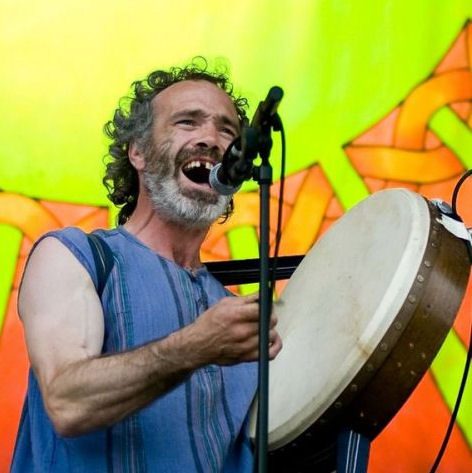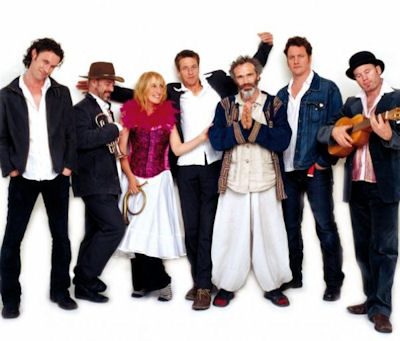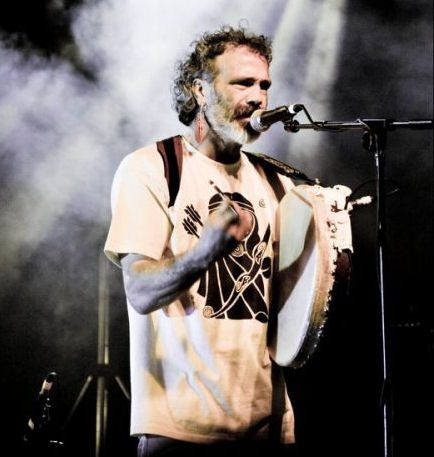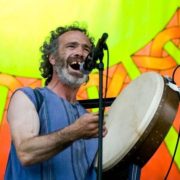The Irish Enigma of Kíla’s Rónán Ó Snodaigh
 Kíla‘s the kind of band that’s lived on the edge of musical scenes their whole lives. They’re Irish and they can play the hell out of Irish trad music, but their albums have spun off into Afro-pop explorations, or Chinese literature inspirations, or world-beat ministrations, or compositional meditations. To call their music experimental might be going a bit far, though some of their more eclectic compositions push far enough beyond the boundaries of what we’d come to expect from the band that they could be termed experiments. Really, it seems that Kíla simply has a roving mind. Their minds rove as they travel and as they experience and are influenced by sounds and ideas from around the globe. They’re a truly global Irish band, at once rooted in their traditions, composing in Gaelic and involving traditional instruments like the Uilleann pipes, but looking forward to collaborations with other global musicians of like minds.
Kíla‘s the kind of band that’s lived on the edge of musical scenes their whole lives. They’re Irish and they can play the hell out of Irish trad music, but their albums have spun off into Afro-pop explorations, or Chinese literature inspirations, or world-beat ministrations, or compositional meditations. To call their music experimental might be going a bit far, though some of their more eclectic compositions push far enough beyond the boundaries of what we’d come to expect from the band that they could be termed experiments. Really, it seems that Kíla simply has a roving mind. Their minds rove as they travel and as they experience and are influenced by sounds and ideas from around the globe. They’re a truly global Irish band, at once rooted in their traditions, composing in Gaelic and involving traditional instruments like the Uilleann pipes, but looking forward to collaborations with other global musicians of like minds.
Lead singer and Irish poet Rónán Ó Snodaigh may be responsible for much of Kíla’s roving. He writes the band’s songs, for the most part holding to his upbringing in the Irish language. His poetry is informed by his background as a renowned percussionist on the Irish bódhran, a much-maligned frame drum that has since spread to the US and across the world. His poetry is also informed by the inherent rhythms of Irish Gaelic, a language that rolls off the tongue and bubbles around the inside of your mouth like a broiling creek. It’s a language with dance meter and cadences built right in, and coupled with the Irish penchant for verbal dexterity, it’s clearly a language of poets. Ó Snodaigh’s songs tumble along with the Irish instruments of the band and form the unmistakable folk-rap that is Kíla’s trademark sound. I wanted to ask Rónán the obvious question of whether the rhythms of hip-hop had also worked their way into his songwriting. Writing over email from his home in the picturesque Dingle Peninsula in Western Ireland, he replies “Yes I think we have all been influenced by hip hop at this stage of the worlds development, but I was also impressed by the early Jamaican dance hall ragga muffin kinda stuff and poets and Lynton crazy johnston. A lot of my musical life I have been surrounded by absolutely amazing singers with beautiful voices. I am not sure how beautiful my voice is for holding long notes, so i play to my strengths. I’m a good percussionist and as with most percussionists I know I can sing to the beats that I play.” Ó Snodaigh also clearly doesn’t hold much for the strict lines between musical genres, and has a broader conception of what Irish music is than you’d expect from a band that’s made their name on the Irish language and its traditions. “It doesn’t have to be obviously Irish music to be Irish music as well,” he writes. “Like it is sometimes not obvious that Glen’s [Hansard of the Swell Season] guitar playing is very Irish but that mightn’t be noticed as that, or even U2’s The Edge.” U2 have paid their due respects to Kíla; Bono himself has called them ‘extraordinary,’ so perhaps the lines are blurring in today’s world of Irish music.

Ó Snodaigh, with his brothers and bandmates Colm and Rossa Ó Snodaigh, grew up in Dublin in an Irish speaking family. He started learning English when he was five, “something I am still at!” he writes. Having visited Ireland myself, I was surprised to hear that an urban Dublin family would speak Irish primarily. Usually I think of Irish as being spoken most organically in Gaeltachts, isolated parts of Ireland set aside as language reservations. But Rónán says, “It’s not that uncommon to find families raised in Irish in major urban centres, as we were. It’s a growing phenomenon. It’s a lovely sound to listen to; a household speaking Irish.” Speaking Irish as a first language and growing up in an urban metropolis like Dublin exposed Ó Snodaigh both to his roots and to his influences. But he’s clearly his own man, and since founding Kíla has embarked on a number of solo albums and solo tours. His latest album, Water Off A Duck’s Back, shows off not only his English writing skills, but also his quirky sense of humor. Myles O Reilly, of Dublin folk-pop band Juno Falls, produced the album, and artist friends of Ó Snodaigh, like Liam Ó Maonlaí of the Hothouse Flowers guest as well. It’s a fun album, though parts of it do hint at more serious Nick-Drake-sounds, something to be enjoyed rather than analyzed. When asked about the inspiration behind the album, Ó Snodaigh replies “Fun was an inspiration, and the total abyss under our feet and the absence of it.” It’s a typically enigmatic response from someone who delights in twisted wordplay.
Rónán Ó Snodaigh is a remarkably busy man these days. Aside from his solo album, Kíla has just released an all-instrumental album, Soisín, and was featured in the soundtrack of the Academy-Award nominated animated film The Secret of Kells. Invited by master French film composer Bruno Coulais to record in Sligo, Kíla contributed two tracks to the film’s soundtrack. He’s also been touring with his old friend Glen Hansard of The Swell Season. I asked Rónán to tell me more about that experience: “After winning the Oscar, the Swell Season were to do a big tour in America. Glen (who is an old friend) rang me and asked me to join them on tour hoping that I could help recreate some of the atmosphere we used to have when we were busking on Grafton Street, all those years ago. Where we learnt our chops all those years ago.”
 It seems that Ó Snodaigh takes on musical projects as they inspire him, throwing himself into the work with an infectious passion. Recently, he composed the music for two BBC nature documentaries. Having spoken out many times before on environmental causes, it was an easy connection for him to make. “I made a collection of music for the Wild Journey’s program in which I built a track for each creature featured and I spent time researching the animals, observing their movements and tried to mimic some of those in each tune. For example when I wrote the butterfly piece i had my eyes closed and I imagined I was a butterfly the whole time. As I played I was flapping my imaginary wings, floating above gardens and feeling the breeze. Or when I did the shearwater I was floating across oceans and I could hear the sound I made in the wind around me. One of my favorites was the blue whale, I imagined I was a real cheeky Blue Whale swaggering into underwater town on a blues riff ready to eat any other fish that moved.” This kind of almost spiritual connection to the natural world is an undercurrent in Ó Snodaigh’s work. I’ve been watching this video over and over of him walking a puppet through his garden, accompanied by the beautiful track “When in Rome” from his 2001 solo album. It’s so simple, but so heartfelt and powerful at the same time.
It seems that Ó Snodaigh takes on musical projects as they inspire him, throwing himself into the work with an infectious passion. Recently, he composed the music for two BBC nature documentaries. Having spoken out many times before on environmental causes, it was an easy connection for him to make. “I made a collection of music for the Wild Journey’s program in which I built a track for each creature featured and I spent time researching the animals, observing their movements and tried to mimic some of those in each tune. For example when I wrote the butterfly piece i had my eyes closed and I imagined I was a butterfly the whole time. As I played I was flapping my imaginary wings, floating above gardens and feeling the breeze. Or when I did the shearwater I was floating across oceans and I could hear the sound I made in the wind around me. One of my favorites was the blue whale, I imagined I was a real cheeky Blue Whale swaggering into underwater town on a blues riff ready to eat any other fish that moved.” This kind of almost spiritual connection to the natural world is an undercurrent in Ó Snodaigh’s work. I’ve been watching this video over and over of him walking a puppet through his garden, accompanied by the beautiful track “When in Rome” from his 2001 solo album. It’s so simple, but so heartfelt and powerful at the same time.
It’s a look at Ó Snodaigh’s softer side, and his keen eye for combining the small details of nature with the big details of human life. Ó Snodaigh’s a published poet, both in English and in Irish, and his 2007 book of English poetry, Garden Wars, has some brilliant passages about natural life as a reflection of our own. And that’s where we’ll leave him for now, at home in his garden in the West of Ireland, humming a tune to himself as he cooks dinner. For a man whose mind roves constantly across the globe, he’s remarkably down-to-earth.
The Garden Escapees
Out the gate
Down the road
Through the fence
Over the wall
And on
On bicycle wheels
On the backs of bees
In birds beaks
Or under our feet
Any which way they could and they would and they will and they did
And they do
They went with the wind
And soaked up the sun
Drank down the rain
And ate what they could from the mud
Ye have to fight hard for a foothold this side of the garden walls
And twice as hard to keep it
(It’s not easy but it’s freedom)
On the side of roads
In under the stones
Down in the ditches
They’ll find, build and make a home
And defend it on their own
No one to water their roots during the dry spell
No one to watch over them and keep them well
No one to preen and prune them and make their bed
No not these flowers They are free Not wild, but free
No one picking at their petals
Breaking off their blossoms
Or dictating the shape of their shoots
No thank you These are the garden escapees
And the difference is They know they are free
Copyright – Rónán Ó Snodaigh – Musician, Gardener & Poet
This post originally appeared on the Hearth Music Blog. Check out our website and roam through our blog and Online Listening Lounge to discover your next favorite artist! We’re dedicated to promoting today’s best Roots/Americana/World musicians.













